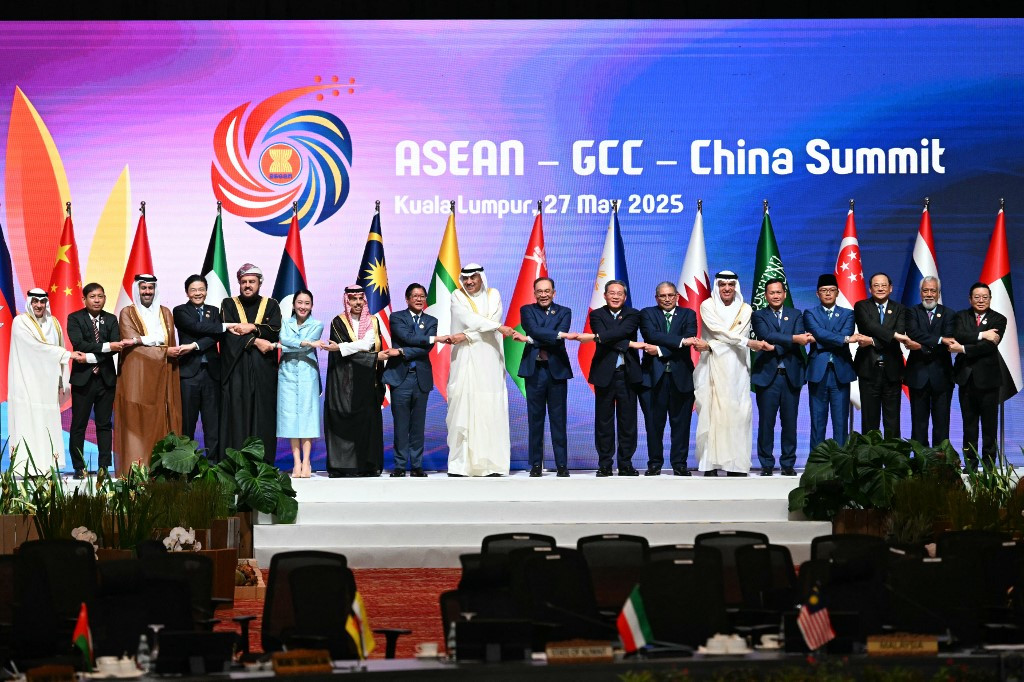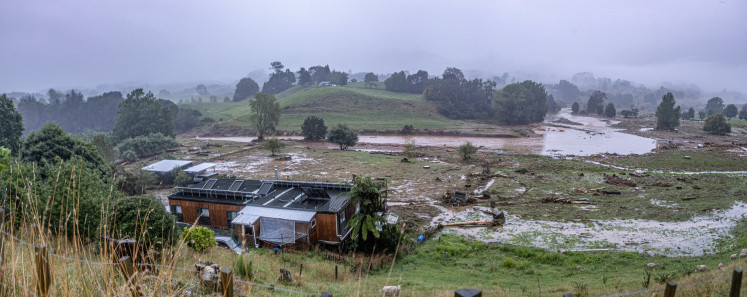Popular Reads
Top Results
Can't find what you're looking for?
View all search resultsPopular Reads
Top Results
Can't find what you're looking for?
View all search resultsASEAN, Gulf and China three-way talks 'response to call of times'
The trade-dependent economies are looking to insulate themselves after US President Donald Trump blew up global trade norms by announcing a slew of tariffs targeting countries around the world this year.
Change text size
Gift Premium Articles
to Anyone
 (Left-right) Secretary General of the Gulf Cooperation Council (GCC) Jasem Albudaiwi, Myanmar's Permanent Secretary of the Ministry of Foreign Affairs Aung Kyaw Moe, Qatar's Minister of Commerce and Industry Faisal bin Thani bin Faisal Al Thani, Singapore's Prime Minister Lawrence Wong, Oman's Deputy Prime Minister for Relations and International Affairs Sayyid Asaad Tariq Taimur Al Said, Thailand's Prime Minister Paetongtarn Shinawatra, Saudi Arabia's Foreign Minister Prince Faisal bin Farhan al-Saud, Philippines' President Ferdinand Marcos Jr, Crown Prince of Kuwait Sheikh Sabah Khaled al-Hamad al-Sabah, Malaysia's Prime Minister Anwar Ibrahim, China's Premier Li Qiang, Brunei Minister of Foreign Affairs Erywan Yusof, Ruler of the UAE's Emirate of Ras al-Khaimah Sheikh Saud bin Saqr al Qasimi, Cambodia's Prime Minister Hun Manet, Indonesia's Minister for Foreign Affairs Sugiono, Laos' Prime Minister Sonexay Siphandone, East Timor's Prime Minister Xanana Gusmao, and ASEAN Secretary-General Kao Kim Hourn pose for a group photo at the ASEAN - Gulf Cooperation Council (GCC) - China Summit after the 46th Association of Southeast Asian Nations (ASEAN) Summit in Kuala Lumpur on May 27, 2025. (AFP/Jam Sta Rosa)
(Left-right) Secretary General of the Gulf Cooperation Council (GCC) Jasem Albudaiwi, Myanmar's Permanent Secretary of the Ministry of Foreign Affairs Aung Kyaw Moe, Qatar's Minister of Commerce and Industry Faisal bin Thani bin Faisal Al Thani, Singapore's Prime Minister Lawrence Wong, Oman's Deputy Prime Minister for Relations and International Affairs Sayyid Asaad Tariq Taimur Al Said, Thailand's Prime Minister Paetongtarn Shinawatra, Saudi Arabia's Foreign Minister Prince Faisal bin Farhan al-Saud, Philippines' President Ferdinand Marcos Jr, Crown Prince of Kuwait Sheikh Sabah Khaled al-Hamad al-Sabah, Malaysia's Prime Minister Anwar Ibrahim, China's Premier Li Qiang, Brunei Minister of Foreign Affairs Erywan Yusof, Ruler of the UAE's Emirate of Ras al-Khaimah Sheikh Saud bin Saqr al Qasimi, Cambodia's Prime Minister Hun Manet, Indonesia's Minister for Foreign Affairs Sugiono, Laos' Prime Minister Sonexay Siphandone, East Timor's Prime Minister Xanana Gusmao, and ASEAN Secretary-General Kao Kim Hourn pose for a group photo at the ASEAN - Gulf Cooperation Council (GCC) - China Summit after the 46th Association of Southeast Asian Nations (ASEAN) Summit in Kuala Lumpur on May 27, 2025. (AFP/Jam Sta Rosa)
C
hinese Premier Li Qiang said Tuesday that the first-ever summit between his country, Southeast Asian leaders and Gulf states was "a response to the call of the times" in a geopolitically uncertain world.
The trade-dependent economies are looking to insulate themselves after US President Donald Trump blew up global trade norms by announcing a slew of tariffs targeting countries around the world this year.
Though he subsequently instigated a 90-day pause for most, the experience has spurred the Association of Southeast Asian Nations (ASEAN) and others to accelerate efforts to diversify their trading networks.
On Tuesday the Malaysian capital hosted the inaugural summit between ASEAN, China and the Gulf Cooperation Council (GCC) -- a regional bloc made up of Bahrain, Kuwait, Oman, Qatar, Saudi Arabia and the United Arab Emirates.
Li told the meeting that "against the backdrop of a volatile international situation", the summit was "a pioneering work of regional economic cooperation".
"This is not only a continuation of the course of history, but also a response to the call of the times," he said.
Opening the talks, Malaysian Prime Minister Anwar Ibrahim said he was confident the three sides could "shape a future that is more connected, more resilient, and more prosperous for generations to come" -- having warned on Monday that "a transition in the geopolitical order is underway".
ASEAN has traditionally served as "a middleman of sorts" between developed economies like the United States, and China, said Chong Ja Ian from the National University of Singapore (NUS).
With Washington looking unreliable these days, "ASEAN member states are looking to diversify", he said.
"Facilitating exchanges between the Gulf and People's Republic of China is one aspect of this diversification."
Malaysia, which holds ASEAN's rotating chairmanship, is the main force behind the initiative, Chong said.
'Timely and calculated'
Beijing has suffered the brunt of Trump's tariffs and is also looking to shore up other markets.
China and ASEAN are already each other's largest trading partners, and Chinese exports to Thailand, Indonesia and Vietnam surged by double digits in April -- attributed to a re-routing of US-bound goods.
Premier Li's participation is "both timely and calculated", Khoo Ying Hooi from the University of Malaya told AFP.
"China sees an opportunity here to reinforce its image as a reliable economic partner, especially in the face of Western decoupling efforts."
Beijing and Washington engaged in an escalating flurry of tit-for-tat levies until a meeting in Switzerland saw an agreement to slash them for 90 days.
Chinese goods still face higher tariffs than most though.
According to a draft statement seen by AFP, ASEAN will express "deep concern... over the imposition of unilateral tariff measures".
But it said earlier this year it would not impose retaliatory duties.
Earlier on Monday, the GCC countries agreed to launch free trade talks with Malaysia on the sidelines of the GCC-ASEAN Summit in Kuala Lumpur, the GCC said in a statement.
Also on Monday, Premier Li called for expanded trade and investment ties with Malaysia, urging the two countries to safeguard free and multilateral trade in a meeting with Prime Minister Anwar Ibrahim on Monday, Xinhua reported.
Li's meeting with Anwar also comes after Chinese President Xi Jinping toured the region last month at the height of Beijing's tariff confrontation with Washington.
Treacherous waters
ASEAN has historically avoided choosing a side between the United States and China.
China is only Southeast Asia's fourth largest source of foreign direct investment, after the United States, Japan and the European Union, noted NUS' Chong.
Anwar said Monday he had written to request an ASEAN-US summit this year, with his foreign minister saying Washington had not yet responded.
Yet any closer alignment with Beijing presents problems of its own, despite Anwar's insistence Monday night that "whatever is being said... we are here as a friend of China".
On Monday, Philippines leader Ferdinand Marcos said there was an "urgent need" to adopt a legally binding code of conduct in the South China Sea.
Beijing has territorial disputes with five ASEAN member states in the area, with China and the Philippines having engaged in months of confrontations in the contested waters.
Anwar raised the South China Sea with Li, the Malaysian prime minister said in a Tuesday Facebook post announcing the one-on-one meeting.
"Other disputants... are perhaps willing to let the Philippines bear the brunt of pressure," Chong said.
Tension between Manila and Beijing "means that these issues will not fade into the background, much as some other Southeast Asian states wish to focus on economic issues", he added.








